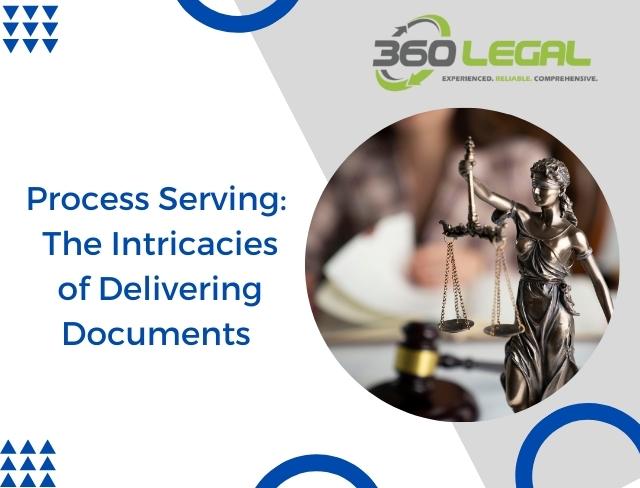Making Sure Legal Conformity Through Expert Process Serving Services
Making Sure Legal Conformity Through Expert Process Serving Services
Blog Article
Recognizing the Value of Process Offering in Legal Procedures
Refine serving is a basic facet of lawful procedures that makes certain all celebrations are notified of their responsibilities and civil liberties. By facilitating the official distribution of vital lawful records, it maintains the principles of due procedure and adds to the integrity of the judicial system. The nuances of effective procedure serving extend beyond simple distribution; they encompass legal demands and prospective repercussions of incorrect solution. Recognizing these intricacies can dramatically influence the outcomes of legal disagreements, motivating a more detailed exam of the practices that underpin this important feature.
Interpretation of Refine Serving
Process serving is a vital element of the lawful system, specified as the formal delivery of lawful records to individuals entailed in a litigation. This procedure makes certain that all events are sufficiently notified of legal activities being taken versus them or to which they are a celebration. Usually, these files include summons, problems, subpoenas, and other court-related documents that need the recipient's interest and action.
The relevance of process offering lies in its function in supporting the concepts of due procedure. It assures that individuals have notification of legal proceedings, therefore giving them a possibility to respond or protect themselves. Appropriate solution of procedure is not simply a step-by-step procedure; it is a basic aspect of guaranteeing justness and transparency in the judicial system.
Refine serving can be carried out by numerous individuals, including professional process-server, regulation enforcement police officers, and even attorneys, depending upon jurisdictional laws. Each approach of service has its very own requirements and practices, which are vital to avoid hold-ups or terminations within the legal structure. Therefore, recognizing the meaning and function of procedure serving is vital for all stakeholders included in legal proceedings.

Lawful Requirements for Refine Offering
Legal requirements for process offering are necessary to make certain that the distribution of lawful documents abides by developed procedures and is identified by the court. Each territory has certain laws controling how and when records must be offered, which may consist of grievances, summonses, and subpoenas.
Commonly, procedure servers have to be impartial third events who are not associated with the situation. They should also abide by state laws regarding solution techniques, which can consist of individual service, substitute solution, or solution by mail. Individual solution entails delivering files directly to the recipient, while substitute solution enables delivery to another accountable individual at the recipient's house or workplace.
Additionally, procedure servers are generally needed to file an evidence of service, a lawful paper that verifies the delivery of papers, with the court. This record consists of details such as the date, time, and method of solution, as well as the name of the individual served.

Role in the Justice System
A vital part of the justice system, procedure serving guarantees that people associated with lawful proceedings are correctly notified of actions taken versus them (Process Serving). This official alert is vital for supporting the principles of due procedure, which mandates that celebrations have the possibility to react to claims made versus them. Without reliable procedure serving, the lawful system would certainly be provided inefficient, as individuals could involve in activities without understanding of pending legal issues
Process-server offer an essential role in securing the stability of the legal procedure. They function as neutral parties, supplying lawful papers such as summons, grievances, and subpoenas, therefore fostering transparency and liability within the judicial structure. By making certain that all celebrations are informed, procedure serving helps to avoid any type of possible unfair benefit, enabling fair engagement in legal procedures.
In addition, the professionalism and trust of process servers adds to the public's rely on the justice system. Their adherence to lawful standards and honest practices enhances the authenticity of the judicial procedure. Eventually, efficient procedure serving is vital in advertising the guideline of regulation and guaranteeing that justice comes to all his response individuals included in legal disputes.
Effects of Improper Solution
The effects of incorrect service can significantly weaken the integrity of legal proceedings. When an event is not served appropriately, it can lead to a host of problems, including delays in case timeline and boosted lawful expenses. Incorrect solution can result in the defendant not knowing the lawsuit versus them, which may stop them from responding appropriately or offering their defense. This lack of notice can inevitably lead to default judgments, where the court rules in support of the complainant without hearing the defendant's side.
Furthermore, incorrect service can provide court orders and judgments void, compeling the plaintiff to reactivate the procedure, which can be both taxing and monetarily difficult. It can likewise unlock to allures and challenges, as the offender might suggest that they were not correctly notified of the process, making complex the lawful landscape better.
Finest Practices for Effective Solution

Second, timing plays a vital function. Offering files quickly can avoid delays in legal proceedings and ensure that all events are notified in a prompt manner. Additionally, hiring a professional procedure server can improve performance, as they are educated to guarantee and navigate prospective difficulties conformity with local legislations.
Third, keeping exact documents of the service process is vital. If disputes arise regarding whether service was correctly performed., documenting the date, time, and fashion of service can give vital evidence.
Verdict
Finally, process serving is a crucial part of lawful treatments, guaranteeing that all celebrations are properly informed and paid for the chance to respond. Following legal demands and best techniques not only promotes the concepts of due procedure yet also strengthens the integrity of the justice system. The effects of improper solution can result in significant hold-ups go now and complications, highlighting the need for effective process serving in promoting justness and access in legal conflicts.
The subtleties of efficient process serving prolong beyond simple distribution; they include lawful demands and prospective effects of incorrect solution.Process offering is a critical element of the lawful system, defined as the formal shipment of legal records to individuals entailed in a court case. Without efficient process offering, the legal system would be rendered inadequate, as individuals can engage in activities without awareness of pending lawful matters.
Refine web servers offer a vital duty in securing the honesty of the lawful process - Process Serving. The repercussions of inappropriate visit homepage service can lead to significant delays and difficulties, highlighting the necessity for efficient process offering in advertising fairness and accessibility in legal conflicts
Report this page